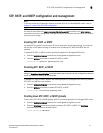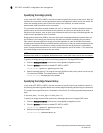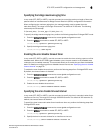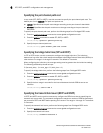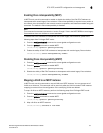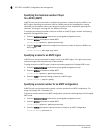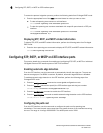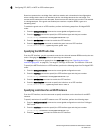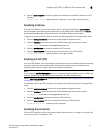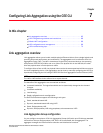Dell Converged Enhanced Ethernet Administrator’s Guide 59
53-1002116-01
Configuring STP, RSTP, or MSTP on CEE interface ports
6
To configure the path cost for spanning tree calculations on the CEE interface, perform the
following steps from Privileged EXEC mode.
1. Enter the configure terminal command to access global configuration mode.
2. Enter the interface command to specify the CEE interface type and slot/port number.
switch(config)#interface intengigabitethernet 0/1
3. Enter the no shutdown command to enable the CEE interface.
4. Enter the spanning-tree command to configure the path cost for spanning tree calculations on
the CEE interface.
switch(conf-if-te-0/1)#spanning-tree cost cost
Enabling a port (interface) as an edge port
From the CEE interface, use this command to enable the port as an edge port to allow the port to
quickly transition to the forwarding state. To configure a port as an edge port, follow these
guidelines:
• A port can become an edge port if no BPDU is received.
• When an edge port receives a BPDU, it becomes a normal spanning tree port and is no longer
an edge port.
• Because ports that are directly connected to end stations cannot create bridging loops in the
network, edge ports transition directly to the forwarding state and skip the listening and
learning states.
• This command is only for RSTP and MSTP. Use the spanning-tree portfast command for STP
(see “Enabling port fast (STP)” on page 61).
To enable the CEE interface as an edge port, perform the following steps from Privileged EXEC
mode.
1. Enter the configure terminal command to access global configuration mode.
2. Enter the interface command to specify the CEE interface type and slot/port number.
switch(config)#interface intengigabitethernet 0/1
3. Enter the no shutdown command to enable the CEE interface.
4.
5. Enter the spanning-tree command to enable the CEE interface as an edge port.
switch(conf-if-te-0/1)#spanning-tree edgeport
6. Enter the spanning tree command again to assign a BPDU filter or BPDU guard.
switch(conf-if-te-0/1)#spanning-tree edgeport bpdu-filter
Enabling the guard root
From the CEE interface, use this command to enable the guard root on the switch. The guard root
feature provides a way to enforce the root bridge placement in the network. With the guard root
enabled on an interface, the switch is able to restrict which interface is allowed to be the spanning
tree root port or the path to the root for the switch. The root port provides the best path from the
switch to the root switch. By default, guard root is disabled.



